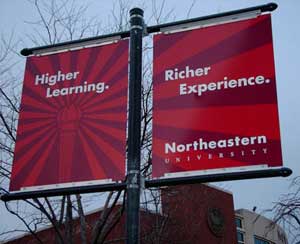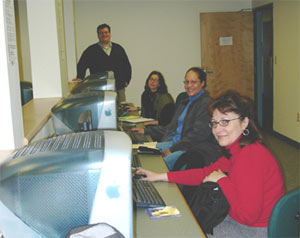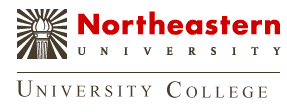Accessible Web Design Program
makes Debut at Northeastern University
Boston Chapter of the Society for Technical Communication (STC)
March, 2003
Potential New Niche Market for Technical Communicators

[Editor's Note: The Accessible Web Design graduate certificate program at Northeastern University is no longer offered. University College is now called the "School of Professional and Continuing Studies".]
Web accessibility is a hot topic, and now there is a brand new place to gain the knowledge and credentials you need to succeed in this increasingly important field.
Northeastern University, in Boston, Massachusetts— already well known for its technical writing program— is now offering a graduate certificate program in Accessible Web Design. This new program, one of the first of its kind, focuses specifically on topics surrounding web accessibility and design for interactive media of all kinds.
"...the accessibility... graduate certificate... give[s] professional technical writers [and] graphic designers... an additional skill to offer an employer."
Rose A. Doherty
Assistant Dean, University College
Northeastern University
The Accessible Web Design program, offered through Northeastern's University College, is the brainchild of Rose A. Doherty, Assistant Dean and Director of Liberal Arts and Criminal Justice Programs, who declared:
"My interest in this area was ignited by a 1999 article in the Chronicle of Higher Education titled "Interactive Design: a Profession in Search of Professional Education." Janet H. Murray (who was then at MIT) points out that work in interactive design is distinct from computer programming and from visual design. She asserts that the new professionals in this field will need visual and verbal skills and an understanding of cognitive processes.
"We added the accessibility focus to the graduate certificate program because we realized that designing for universal use would (1) give people with disabilities improved access to everything the Web has to offer; (2) make good business sense for all organizations; and (3) give professional technical writers, graphic designers, programmers, e-business managers, and others an additional skill to offer an employer."
The four-course graduate certificate program teaches information delivery professionals the principles of designing accessible human-computer interfaces, anticipating the needs of the growing number of people needing accessible accommodations, and creating more universal web sites.
As the course catalog states, this program helps technical communicators to:
- Develop skills to help your organization reach more people more effectively.
- Learn to apply the cognitive theory behind all human-computer interaction.
- Apply communication theory to writing and designing for interactive Web sites.
- Make federal and private accessibility guidelines work for your organization.
- Discover how functioning as part of a professional interactive design team will leverage skills for your career growth.
"...the market for writers and designers with expertise in accessibility will grow...."
Michael J. Salvo
Assistant Professor of English
Northeastern University
The Accessible Web Design program consists of two conceptual courses, "Communication for Interactive Media" and "Human Factors and Interactive Design", and two hands-on courses, "Accessibility and Interactive Technologies" and "Interactive Project Development". Brief course descriptions follow:
- "Communication for Interactive Media" focuses on the relationship between communication principles and interactive design, and on making information more accessible to a wide range of audiences.
- "Accessibility and Interactive Technologies" relates design principles to interactive sites through analysis of existing sites, and through the development of individual and group sites. The course pays special attention to using adaptive technologies to enhance accessibility.
- "Human Factors and Interactive Design" presents how humans and computers interact by exploring human cognitive processes, and examines how disabilities affect human-computer interaction.
- "Interactive Project Development" considers the coordination and collaborative efforts of cross-functional teams in creating effective accessible interactive projects.
Neil F. Duane, Technical Communications Consultant and Advisor, and instructor of "Accessibility and Interactive Technologies", put it this way:
"Completion of the courses required for this certificate will prepare and encourage our technical writers, programmers, and designers to address interactive design and accessibility for the first time as a collaborative endeavor. This is a truly unique concept that should find wide acceptance within the ranks of graduate professionals."
A wide variety of motivations bring people to this program.

Students (in the photo, from right) Anne Russo-Quinn, Lucille Blaschke, and Lori Gillen join Assistant Professor of English Michael J. Salvo for "Communication for Interactive Media", one of the courses in Northeastern University's trail-blazing graduate certificate program in Accessible Web Design.
After a career in technical communications, P.J. Gardner recently formed her own business developing accessible web sites for businesses, professionals, and individuals. Says P.J., "There are so many tradeoffs in balancing accessibility, browser compatibility, and good design principles, I want to absorb as much as I can so that I can do a better job of meeting people's needs in delivering and viewing information using Web technologies."
Lucille Blaschke, who developed Web content for an audience over 50 for several years, became motivated in addressing the accessibility issues that will affect internet users as they age. Lucille declares, "The more research I did, and as I age myself, the more interested I became in Web accessibility. It is important to address the accessibility issues aging Internet users are facing in order to retain our audience."
Anne Russo-Quinn, a visual designer with extensive experience in paper-based and online communications, wants to increase her understanding of the needs of people with disabilities and to communicate ideas more effectively. Anne outlines her goals: "I am hoping this program will fill in the gaps in my understanding of the needs of end users and also communicating successfully to my intended audience."
Due to her own hearing loss, Lori Gillen, founder of the Boston chapter of the Society for Technical Communication's Accessibility SIG, is passionate about raising awareness concerning the barriers that people with disabilities experience in processing information every day. She says, "My mission is to spare people the pain that I suffered through the years when I blamed myself totally for all the wrongdoing of bad design."
This brand new program has just completed its first course, "Communication for Interactive Media", taught by Michael J. Salvo, Assistant Professor in English at Northeastern University. Asked his primary course objective, Salvo replied:
"Professional communicators often represent users in the process of designing and developing technology, charging us with ethical responsibilities to accurately and meaningfully assert user needs during technological development. I want students to think beyond technology-centered development and towards human-centered development of technology."
Now that the students have completed their first course, they are eager to continue examining how universal design principles can be applied to creating more accessible and usable information products, and in advocating for the value of accessibility in the workplace.
Salvo foresees a robust job market down the road for technical communicators with expertise in accessibility. "I think the market for writers and designers with expertise in accessibility will grow, and with it, the need for experts trained in accessibility issues," he predicted.
© 2003 P.J. Gardner and Lori Gillen. All rights reserved.



